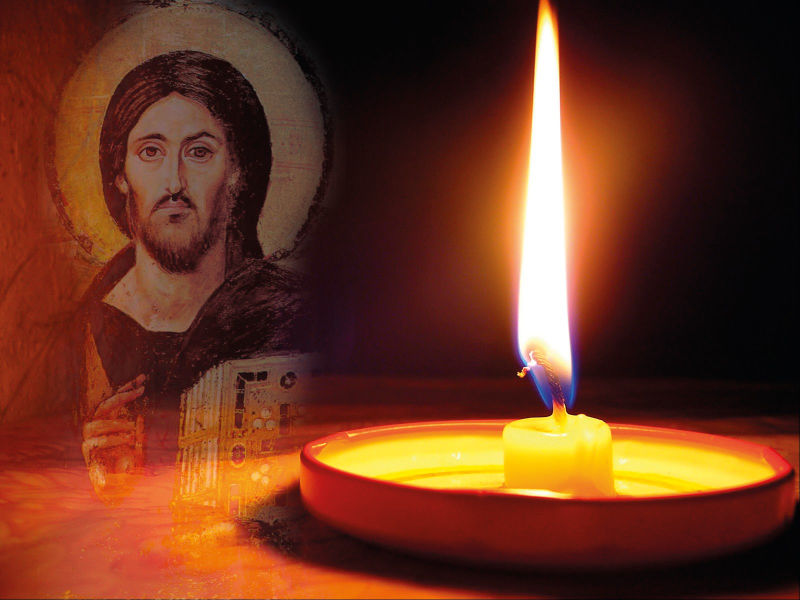
From the beginning of creation to the present, the human race has received innumerable blessings from God, which we continually seek in our common worship. Despite our sinfulness, we take courage in approaching God with our supplications. The Prayer which the Priest addresses to God during the Divine Liturgy at the 3rd Antiphon ends with the words: Lord we are asking You of all these “Because You are good and loving [charitable] God …” Similarly the Priest, after the series of petitions (which is called “The Great Litany”) in all holy Services, pronounces aloud: “For you are benevolent and charitable God …”
St. Basil the Great summarizes the benevolence of God in the Prayer of Offering (Anaphora), which is offered in his Divine Liturgy. This special prayer outlines the countless ways God's love for man was demonstrated throughout time, speaking of the creation of man “according to His own image,” and the placing of humanity in Paradise to enjoy His bounty. When mankind turned against God, He did not reject us in turn, but continued to reach out to us “in various ways because of His profound mercy.” He sent his Prophets to announce the salvation that was to come; “He set Guardian Angels” for humanity; and when the right time arrived, He sent His Only-Begotten Son to sacrifice Himself so that the gift of eternal life was possible, and continues to be so with His Holy Body and Blood!
These constant blessings from God come from his endless love for humanity, and they exist not only in the general sense, but also in the life of individuals. An example of this can be seen in today's Gospel reading, with the healing of the paralytic of Bethesda. The Lord went to Jerusalem and straight to the place where a great crowd of people with various afflictions (blind, lame, and paralyzed) waited to be healed. They were all in line to be first in the pool after an Angel stirred up the water (see John 5:1-4). Jesus noticed among them a man who had been suffering disease and paralysis for 38 years. This miserable man had no one to help him get well, but that all changed when the One who is God-man came to see him. This is something we also should keep in mind, when we feel alone and abandoned. “My father and mother forsook me, but the Lord laid hold of me and protected me”, says the Psalmist (Psalms 26 [27]:10). The same thing happened to the paralyzed man. The Lord came to this man in order to help, although not quite in the way he expected, providing something greater, which is how God acts. Nothing God does is arbitrary, and He respects the freedom (which He Himself granted) of the individual person.
This is what Jesus did in this case as well. It was perfectly clear why the paralytic man was there (to be healed), and the Lord certainly knew this. He did not cure him right away, but instead asked the paralytic man this question: “Do you want to be made well?” (John 5:6). He wanted the healing to take place with the man's own consent. Once the Lord heard his desire to be healed, He not only cured him of his disease, but immediately gave him the strength to get up and walk, even carrying his own bed (see verses 7-9).
This is our Lord and God, filled with supreme love for mankind! Because God loves us as no one else can, He also has the power to help us where human efforts fail. This supreme love is eternal, transcending this earthly life, and confirming that He is the source of all grace and mercy.
My dear brothers and sisters, in remembering all of this, we realize that God constantly seeks to help us and bless us. The Psalmist writes: “Surely goodness and mercy shall follow me all the days of my life” (Ps. 22[23]:6). We should never forget this, and also realize that we too have a role, by saying “yes” to God. Some may grumble at this, wondering why we have to do that, since “God sees and knows everything.” They ask the question: What then is the point of prayer? The answer is vital to our spiritual life: The act of asking Him for everything is one of collaboration. This is why our Lord urges us: “Ask, and it will be given to you” (Matthew 7:7).
So when we talk to God in our prayers, we should not feel that He is this harsh, difficult and angry figure that punishes our sins. He is not a hard Father that we have to fall down and beg for mercy and help from. The Lord knew that the cause of the paralytic man’s condition were his sins. Even so, the Lord was still eager to restore his health. The Lord’s benevolence supersedes His justice. As the First Prayer of the Vespers service says, the Lord is “powerful in mercy and good in strength, in helping and comforting and saving those who have their hope in His holy name.”
This is the sense that we must have about the Lord our God, that He is our greatest benefactor. His love for us compels Him to seek opportunities to help us. May we joyously come to God for refuge, firmly entrusting the Benevolent Lord with our every need.





